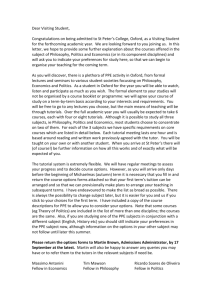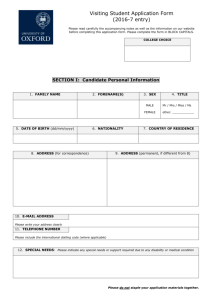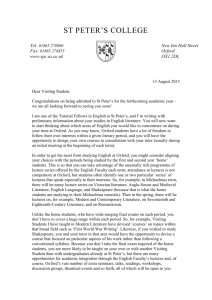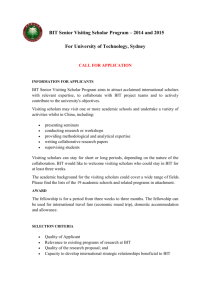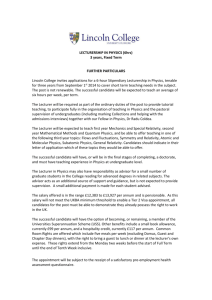LINCOLN COLLEGE, OXFORD
advertisement
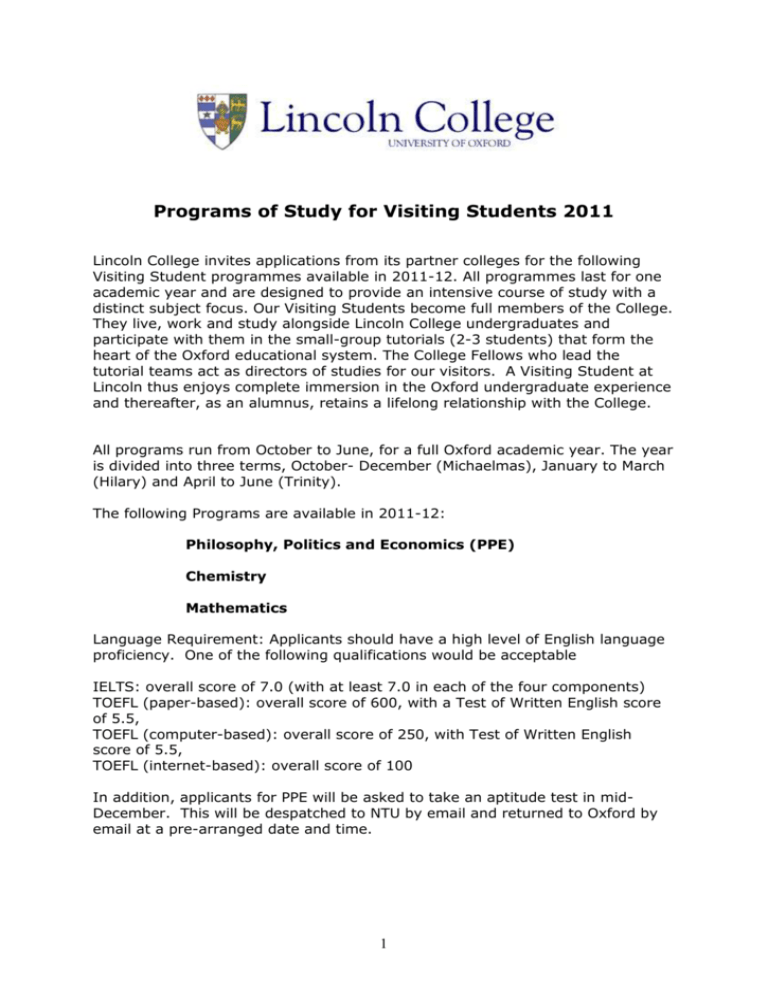
Programs of Study for Visiting Students 2011 Lincoln College invites applications from its partner colleges for the following Visiting Student programmes available in 2011-12. All programmes last for one academic year and are designed to provide an intensive course of study with a distinct subject focus. Our Visiting Students become full members of the College. They live, work and study alongside Lincoln College undergraduates and participate with them in the small-group tutorials (2-3 students) that form the heart of the Oxford educational system. The College Fellows who lead the tutorial teams act as directors of studies for our visitors. A Visiting Student at Lincoln thus enjoys complete immersion in the Oxford undergraduate experience and thereafter, as an alumnus, retains a lifelong relationship with the College. All programs run from October to June, for a full Oxford academic year. The year is divided into three terms, October- December (Michaelmas), January to March (Hilary) and April to June (Trinity). The following Programs are available in 2011-12: Philosophy, Politics and Economics (PPE) Chemistry Mathematics Language Requirement: Applicants should have a high level of English language proficiency. One of the following qualifications would be acceptable IELTS: overall score of 7.0 (with at least 7.0 in each of the four components) TOEFL (paper-based): overall score of 600, with a Test of Written English score of 5.5, TOEFL (computer-based): overall score of 250, with Test of Written English score of 5.5, TOEFL (internet-based): overall score of 100 In addition, applicants for PPE will be asked to take an aptitude test in midDecember. This will be despatched to NTU by email and returned to Oxford by email at a pre-arranged date and time. 1 1. Politics, Philosophy and Economics (PPE) Visiting Students typically join the second year of the degree course, and choose from the courses available in at least two of the three subject areas of the PPE program. Students without the appropriate level of prior experience in a chosen area will be directed to the relevant first-year core courses. Tutorials are normally paired, although in the case of Economics, there might be groups of 3 or 4. Students normally undertake two subjects per term in each of the three terms. The following core courses and some options are be available in each area: Philosophy: History of Philosophy from Descartes to Kant Knowledge and Reality Ethics Economics: Microeconomics (MT) Macroeconomics (HT) One Economics Option (TT) chosen from the range available Politics: Comparative Government British Politics and Government in the Twentieth Century Theory of Politics International Relations Political Sociology Applicants for this course will be asked to take a brief writing test, lasting 1 hour. This will require the candidate to write two short essays, chosen from a selection of six topics. These topics will be very general, will require no specialised knowledge and will ask the student to develop an argument in response to some intellectual or social dilemma. The questions are very similar to those used within the writing task component of the TSA aptitude test taken by all applicants to the full degree programme in PPE. See the TSA website for examples of writing tasks used in previous years: www.admissionstests.cambridgeassessment.org.uk/adt/tsaoxford/Test+Preparat ion 2. Chemistry Visiting students normally follow courses in the three divisions of Chemistry: Inorganic, Organic and Physical Chemistry. Where appropriate, visitors will follow the complete second year of the Oxford undergraduate program, but students can also follow the first year program, or, if necessary, a mix of courses from each year, according to their level of prior experience in each of the three deivisions. . There will be practical classes and lectures as well as weekly tutorials. Details concerning the courses available are given on the Oxford Web Site at www.chem.ox.ac.uk/teaching/ Lecture synopses are also given on the web site. College Faculty: Dr Michael Willis, Dr Roel Dullens. 2 3. Mathematics Visiting Students normally follow the second year of the Oxford undergraduate degree programme, although the levels of courses followed can be tailored to each student’s prior experience. The second year course consists of three compulsory subjects (Algebra, Analysis, Differential Equations) and a number of options chosen from the following: Introduction to Fields Number Theory Topology Calculus of Variations Quantum Theory Probability & Statistics Group Theory Integration Multivariable Calculus Classical Mechanics Fluid Dynamics and Waves Numerical Analysis The compulsory core material is studied in Michaelmas Term. The options are studied in Hilary, and Trinity Term. Not all options will be available in each year. Further information and sample assignments can be consulted on the Mathematics website: www.maths.ox.ac.uk/currentstudents/undergraduates/handbooks-synopses. Lecture courses for each of the compulsory and optional elements are provided by the Mathematical Institute. Tutorials on each element are provided by Fellows of Lincoln College and, occasionally, by specialists from other Colleges. College Faculty: Professor Alexis Vasseur, Dr Dominic Vella, Dr Ursel Kiehne, Dr Sirichai Chongchitnan Program Costs University and College Fee rates for 2011-12 are currently being finalised. For guidance, applicants may note that the programme costs for 2010-11 were £31,090 for PPE course and approximately £31,875 for the science courses. These sums include all tuition fees, accommodation in college for all three terms of the course, and some meals. Further information about the College can be found on the College website www.lincoln.ox.ac.uk 3
